Charlie Hebdo Says Iran's Threats For Caricatures Show Weakness
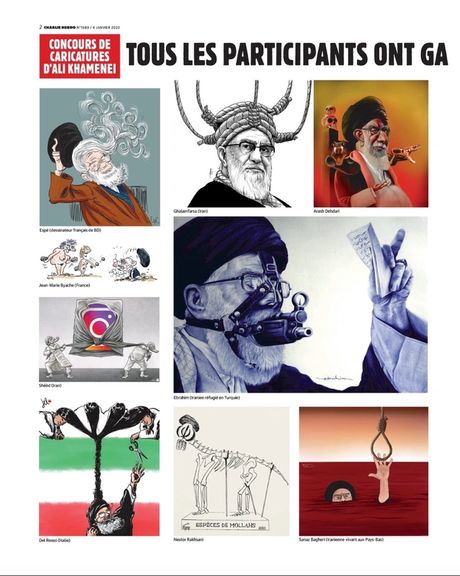
The French satirical magazine Charlie Hebdo in a note in Farsi called the Islamic Republic's threats an indication of the weakness of the religious dictatorship in Iran.

The French satirical magazine Charlie Hebdo in a note in Farsi called the Islamic Republic's threats an indication of the weakness of the religious dictatorship in Iran.
The magazine last week published caricatures depicting Iran’s 83-year-old authoritarian ruler Ali Khamenei, which immediately prompted official protests to the French government and threats against the publications.
Asserting that it will publish more cartoons of Iran’s clerics, Charlie Hebdo wrote “The mullahs aren't happy. The caricatures of their supreme leader... do not seem to have made them laugh," the paper's editor, known as "Riss" wrote Tuesday.
"It is an honor in one sense, but above all proves that they feel their power is very fragile," added Riss.
The satirical magazine was hit by a cyber-attack after publishing the caricatures.
"A digital attack doesn't leave anyone dead, but it sets the tone. The mullah's regime feels in such danger that it considers it vital to its existence to hack the website of a French newspaper," noted Riss.
Hossein Salami, Commander of the Revolutionary Guard, threatened the staff of the French magazine with revenge on Tuesday.
"Sooner or later, Muslims will take revenge and you may arrest the avengers, but the dead will not rise again,” said Salami.
Earlier, Iran’s Foreign Minister Hossein Amir-Abdollahian called the publication of Khamenei's caricatures "an insult to the sanctities", claiming that the Israeli "lobby" was behind the move.
Some government officials and groups in different countries have condemned the threats and called for more pressure against the Iranian regime.
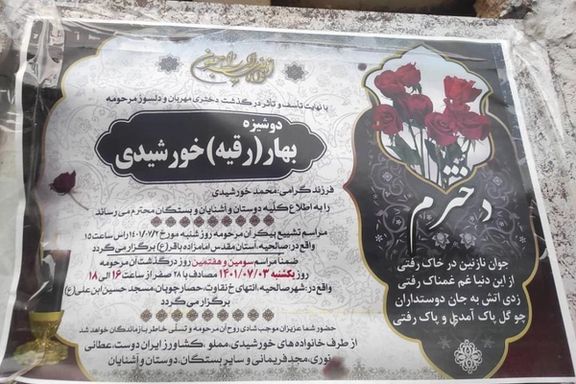
Bahar Khorshidi was an English and painting teacher who fell to her death from the fourth-floor window of her home when security forces came looking for her.
According to information obtained by Iran International, 23-year-old Bahar had left home in Robat Karim town near the capital Tehran along with her 18-year-old sister Reyhaneh to distribute flyers with hashtags in support of Mahsa Amini and the motto of the current wave of protests “Women, life, liberty.”
Those days were the early days of the protests, a few days after Mahsa was killed in police custody on September 16, triggering the biggest uprising the Islamic Republic has ever experienced.

According to one of the neighbors, they were identified and chased by plainclothes agents, so they escaped to a tailor’s shop they know in their neighborhood. From there, Bahar, who was suffering from heart problems, was taken home but before she returned home, the agents had raided their home and had detained her mother and sister and were taken to the office of the Intelligence Organization of the Revolutionary Guard in the city.
A few hours later, on September 23, the agents who had chased Bahar and knew she was about to arrive home, raided their home again while only Bahar and her 11-year-old sister and eight-year-old brother were home. After a few minutes, in which it is still unclear what happened, Bahar fell from or was thrown out of the fourth-floor window.
According to Iran International sources, it is not clear if she threw herself down in fear of the officers, or was thrown during a scuffle with them, or the agents threw her down from the window.
A few hours after the incident, her mother and sister were released and they were told that "Bahar committed suicide and threw herself down".
One of the neighbors told Iran International that the building was surrounded by dozens of security agents after the incident, apparently in fear of a reaction by the people who were aware of the tragic event.

Under the pressure of the security agents, Bahar was buried the following day in a local cemetery with numerous agents in attendance. Iran International sources say the cause of death of the young protester was announced as suicide, and the family left their city to live in a small town in northern Iran to get rid of the pressure by security forces who did not want them to talk to the media.
In addition to over 500 protesters who have been killed during nearly four months of unrest, more than a dozen detainees have been sentenced to death. The Islamic Republic has already executed four people over their participation in demonstrations. Security forces and the hardliner Judiciary have claimed that many of the dead protesters committed suicide or medical preconditions.
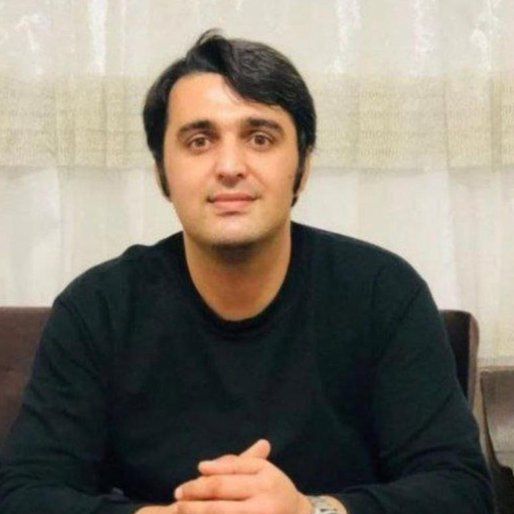
Reports say three more Iranian citizens arrested during antigovernment protests in Iran’s northern city of Nowshahr, have been sentenced to death.
The three are identified as Javad Rouhi, Kimia Javadi and Mehdi Mohammadifar.
Mizan news agency affiliated with the judiciary said Tuesday that Javad Rouhi was sentenced to death on charges of "corruption on earth" and "moharebeh" or “War against God”.
The Judiciary claimed Javad Rouhi has been one of the leaders of the protests in the city and insulted the religious sanctities by setting fire to Quran.
Mizan claimed that five people have been killed during the protests in Nowshahr on December 11 when Javad Rouhi “was leading the unrest”.
The accusations come as the regime does not let the defendants have access to their lawyers and holds sham trials based on forced confessions.
Mizan wrote that the decision can be appealed in the Supreme Court.
According to the Norway-based Iran Human Rights Organization, at least 109 Iranian protesters are currently at risk of execution or facing death sentences.
Iran Human Rights organization also stressed that repression through arbitrary arrests, physical torture, sexual assault and rape in detention and the mass issuance of sentences has been intensified.
The Islamic Republic has executed four protesters up to now amid international condemnations.
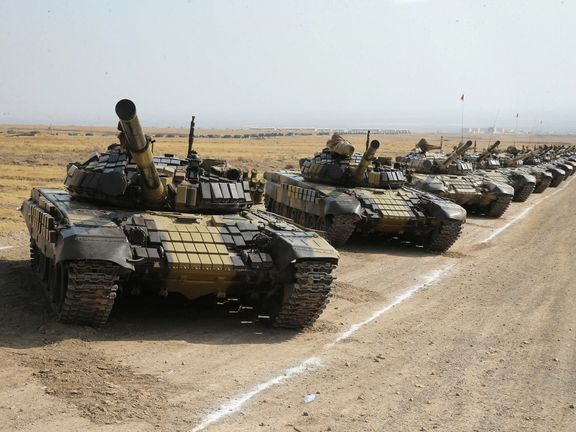
The United States’ proclaimed concentration on Ukraine and China at the expense of the Middle East has prompted criticism from various directions.
For several months, officials in the administration of President Joe Biden have stressed that US foreign-policy priorities, reflected in staff time, have been the Russia-Ukraine conflict and calibrating policy towards the rise of China.
With the Middle East, leading US officials have said for several months that efforts to restore the 2015 Iran nuclear deal are no longer a ‘focus,’ that the current ceasefire in Yemen is sustainable, and that the US can both co-operate with the new Israeli government of Benjamin Netanyahu and keep its commitment to a ‘two state solution’ for Palestine-Israel.
Ned Price, the State Department Spokesman, was asked at his Monday press briefing about Biden’s campaign-trail statement in November, which emerged December, that the Iran nuclear agreement (the JCPOA, Joint Comprehensive Plan of Action) was “dead.” Price insisted that Biden “did not say diplomacy is dead, not at all.”
Price was then asked about a “hypothetical” case of Iran accepting US conditions for JCPOA restoration. The spokesman said that as long as Tehran lacked “any real interest in diplomacy,” then Washington would “continue to keep our focus on supporting the Iranian people...[and] Iran’s security assistance to Russia.”
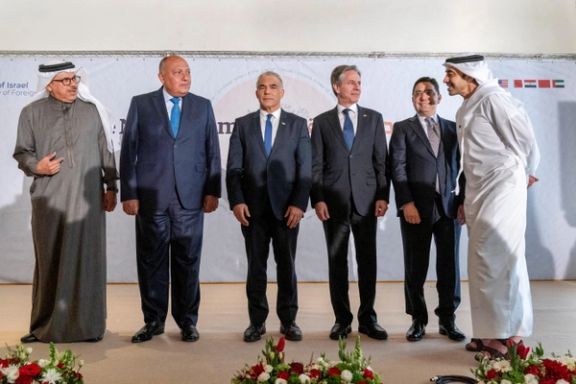
Since great-power talks to revive the JCPOA floundered in late summer with Washington and Tehran unable to bridge gaps, the US has levied additional sanctions on Iran and those trading with Iran, while Tehran has continued a nuclear program that since 2019 has exceeded JCPOA limits. The US sanctions have come under various rubrics – violation of the ‘maximum pressure’ sanctions introduced by the US in 2018 on leaving the JCPOA, ‘human rights,’ and Iran’s supply of military drones to Russia.
Iran nuclear snapback – a ‘decision’ for Europe
Price said Monday that any decision over snapback – a JCPOA mechanism that could see multilateral sanctions on Iran snap back if it violated the 2015 agreement – was a “decision for our European partners,” referring to the trio of France, Germany and the United Kingdom. All three take the US view that Iran’s supply of drones to Russia violates a clause in United Nations Security Council Resolution 2231, which endorsed the JCPOA.
But the challenge of a new right-wing government in Israel seems more pressing. Both Secretary of State Antony Biden and National Security Adviser Jake Sullivan are due in Israel this month, with US officials stressing a common commitment to prevent Iran acquiring a nuclear weapon.
This, along with an emphasis on the potential of Israel’s US-sponsored 2020 ‘normalization’ agreements with four Arab states, sits uneasily with US concern that Benjamin Netanyahu’s government is already taking steps likely to enflame the volatile situation in the occupied West Bank. Price conceded at his Monday press briefing that normalization agreements were “not a substitute for Israeli-Palestinian peace.”
Under a headline dubbed ‘The Perils of Ignoring the Middle East,’ Walter Russell Mead, professor at Bard College, argued in his Wall Street Journal column Tuesday that a “15-year decline in America’s regional influence” could be reversed by “a resolute and effective US policy to disrupt Iran’s ability to threaten its Iran neighbors…[including] if all else fails…military action to block Tehran’s nuclear program…[and] put the US back at the center of the Middle Eastern order.”
Read, a staunch supporter of the US interventions in Iraq and Syria but not Libya, argued that Biden’s current approach rested on an “impotence” that was “more expensive in the long run.”
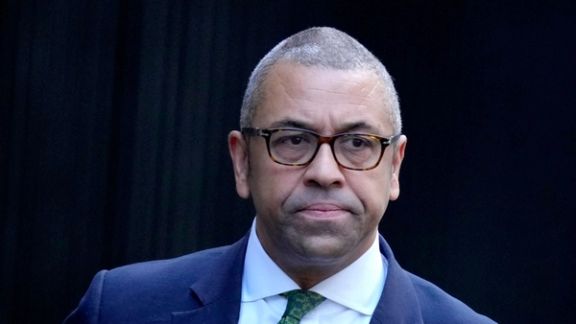
Global consequences of hanging of two more protesters continue for Iran with the EU and UK summoning the Islamic Republic’s ambassadors on Monday.
Stefano Sannino, the secretary-general of the European External Action Service (EEAS), reiterated the European Union's outrage to the ambassador, Hossein Dehghani, saying that the bloc is appalled by the executions at the weekend of two Iranians arrested in the course of the regime’s crackdown on anti-government protests, ignited by the death of Mahsa Amini in custody of hijab police.
He also repeated an EU call on the regime’s authorities to annul without delay death sentences already pronounced against other protesters. Iran's judiciary said Monday that a court has sentenced three more protesters to death for “war against God”.
Earlier in the day, Britain's foreign minister James Cleverly summoned Iran’s most senior diplomat on Monday after Iranian authorities executed protestors Mohammad Mahdi Karami and Seyyed Mohammad Hosseini."Today I have summoned the Iranian Chargé d’Affaires to condemn in the strongest possible terms the abhorrent executions we witnessed over the weekend," he said in a statement.
The two men were hanged on Saturday for their alleged role in the killing of a government agent during protests that followed the death of Amini, creating uproar in the international community against the Iranian regime.The latest execution brings the number of protesters officially known to have been executed since the unrest to four.

A Norway-based human rights organization says at least 109 Iranian protesters are currently at risk of execution or facing death penalty sentences.
The Oslo-based Iran Human Rights Organization announced in its latest report that is a minimum estimate as most families are under pressure to stay quiet, and the real number is believed to be much higher.
The list includes both officially reported cases and those reported by family members and citizen journalists.
Since December 27 when it first released a list, nine people have been released on bail, one is no longer in custody, and two who were executed, have been removed.
21 other protesters who are at risk of death penalty charges, sentences or execution have been added to the current list, noted the human right body.
Iran Human Rights organization also stressed that repression through arbitrary arrests, physical torture, sexual assault and rape in detention and the mass issuance of sentences has been intensified.
“There have been enough cases reported throughout the country to conclude that it is not merely isolated incidents but a systematic policy by the government,” underlined the IHRNGO.
It also announced that at least 481 people including 64 children and 35 women, have been killed by security forces since mid-September, following the death of Mahsa Amini in police custody, which triggered the protests.
It further pointed out that the Islamic Republic is intentionally creating confusion by sharing contradicting statements, particularly in death penalty cases.